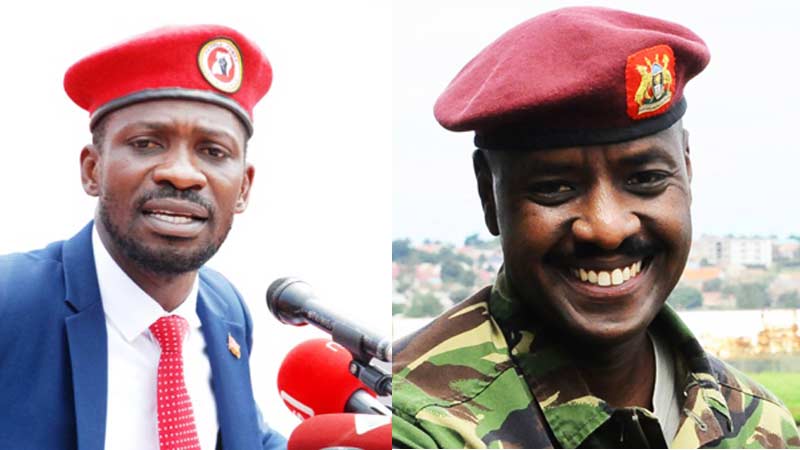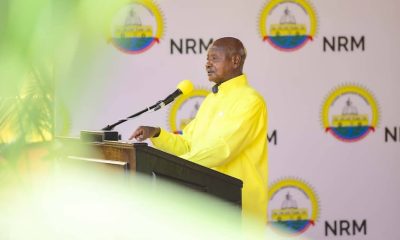The Other Side of the Coin
As the world ushers in young leaders, ‘dinosaurs’ go home

The young turks; NUP’s Robert Kyagulanyi and NRM’s Muhoozi Kainerugaba want to take over from the old guard
The average age of African leaders is more than 60 while the median age of her her population is 19 years, according to Statista.com, an online data portal. This means that the continent has the youngest citizens with the oldest rulers. According to a CNN article, an associate professor of international studies at Princeton University in the US, noted that “the average age of the ten oldest leaders in Africa is 78.5 compared to 52 for the world’s ten most-developed economies.” And this happens in countries where over 60% of the population are youths.
Sub-Saharan Africa has been home to many of the world’s longest-ruling heads of state. Since 1960, a dozen heads of state across sub-Saharan Africa have held office for more than thirty years. Military coups have become less common, but incumbents have increasingly used so-called constitutional coups to secure longer terms. Fortunately in some countries, pressure from civil society and regional blocs has successfully halted leaders’ attempts to extend their rule. The likes of Zambian President Frederick Chiluba, Malawian President Bakili Muluzi, Nigeria’s Olusegun Obasanjo and many others tried to lift term limits to extend their tenure in office, but failed.
Some African ruling ‘dinosaurs’ are slowly being pushed out of power and this creates a stage for a brand of new politics. Abdelaziz Bouteflika, the former President of Algeria and the 75 year old former President of Sudan Omar al-Bashir, fell victim to mass movements spearheaded by young protesters, though in each case the once-powerful rulers were left vulnerable when armed forces withdrew their support. Tunisia was the first country to topple its longtime autocratic leader, Zine el-Abidine Ben Ali. Tunisian leader was deposed on January 14, 2011, and forced to seek exile in Saudi Arabia after 24 years in power.
Egyptian strongman Hosni Mubarak was the second leader to be forced from his presidential palace as the Arab Spring began to gain traction. The first protests erupted on January 25, 2011, and would lead to more than two weeks of strikes and demonstrations. Muammar Gaddafi was once the longest-reigning dictator in both the Arab world and Africa after having spent 42 years in power but Protests broke out in 2011, following the arrest of prominent human rights activist Fethi Tarbel and he was also ousted.
There is a new wave of young leaders now sweeping across the continue and the world over. There is unquenchable thirst for political leadership among the youths and this sends a ray of hope that the future is brighter. This growing spirit that the youths must also come to the political table is unstoppable.
The youths claim that the World’s oldest leaders have not solved, leave alone paid attention to their problems so they need leaders whose programs resonate with their expectations. According to the African Development Bank, one-third of Africa’s 420 million youths are unemployed, another third are vulnerably employed while only one in six young people is gainfully employed.
It should also be noted that Africa’s population will be 1.6 billion by the year 2030, according to the UN Department of Economic and Social Affairs, and the rapidly growing youth population will constitute 42% of that number. The youth will need opportunities to participate in politics, jobs and overall inclusion in development. And this should not wait for 2030; it starts now. Actually it has already started and it is happening world over. Citizens in Africa, Asia, Europe, Latin America and the Middle East are on the streets to raise their voices against inequality, corruption and bad governance. And while from Italy to Iraq and Venezuela to Zimbabwe they promoted wildly differing slogans, the subtext was always the same: the system is not working.
The youth at the forefront of these movements are no longer comfortable to just push for change from the fringes of power. Increasingly they are taking the reins themselves, either through the democratic process or by spearheading protest movements that command the world’s attention. Countries such as France, Ireland, Austria and Ukraine are turning to younger leaders and new styles of leadership. At only 43, Finland’s Sanna Marin, became the world’s youngest Prime Minister, only to be upstaged a few weeks later by the return of Austria’s Sebastian Kurz, who was sworn in as Chancellor for a second term at the age of 33. Kurz and Marin are the latest in a wave of politicians in their 30s winning leadership roles, including New Zealand’s Prime Minister Jacinda Ardern at 39 and El Salvador’s President Nayib Bukele at only 38.
In India, more than 65 percent of the population is under the age of 35, but for the past two decades, the average age of MPs has always been above 50. Despite the increased interest in politics, the majority of Indian Youth don’t consider politics as a genuine career option, and this data highlights both the lack of representation of youth in formal political institutions and their interest. A young country deserves energetic, skillful, enthusiastic young leaders. So, here are a few young leaders who are breaking away from this traditional stereotype and are taking charge of Indian politics
At only 21 years Arya Rajendran sent shock waves when she became the youngest mayor in India while pursuing a BSc Mathematics degree. She claims to have started her political journey as a child activist. Nadia Whittome, who had just been elected the U.K.’s youngest parliamentarian at age 23 told the TIMES Newspaper that young people have been growing up around people who have only struggled to put food on the table but they still know that the crises they face now are huge in scale and that the solutions to them need to be equally bold and implemented urgently especially by young brilliant minds.
The future is not only bright but also youthful. It is time for the youth to take the front pews and determine their destiny. The space is getting smaller and smaller for the old generation as many of them are now becoming spectators and those who must cling onto power have to fasten their seat belts because the wave is at their doorsteps.
senkumbasunrise@gmail.com
Comments






















